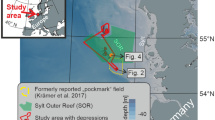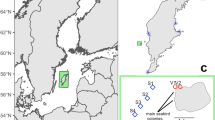Abstract
Hurley and McKnight1 have reported that the pelagic tunicate Pyrosoma atlanticum atlanticum rests on or swims just above the sea-floor at a depth of 160–170 metres. Indirect observations made on this species in the course of a line-fishing survey of the fishes of the south-eastern Australian continental slope2 corroborate the concentration of this species near the sea-floor and extend the habitat to the floor of the continental slope.
This is a preview of subscription content, access via your institution
Access options
Subscribe to this journal
Receive 51 print issues and online access
$199.00 per year
only $3.90 per issue
Buy this article
- Purchase on Springer Link
- Instant access to full article PDF
Prices may be subject to local taxes which are calculated during checkout
Similar content being viewed by others
References
Hurley, D. E., and McKnight, D. G., Nature, 183, 4660 (1959).
Cowper, T. R., and Downie, R. J., C.S.I.R.O., Aust. Div. Fish. Oceanogr. Rep. No. 6 (1957).
Thompson, Harold, “Pelagic Tunicates of Australia” (Commonwealth Council for Scientific and Industrial Research, Australia, Melbourne, 1948).
Author information
Authors and Affiliations
Rights and permissions
About this article
Cite this article
COWPER, T. Occurrence of Pyrosoma on the Continental Slope. Nature 187, 878–879 (1960). https://doi.org/10.1038/187878b0
Issue Date:
DOI: https://doi.org/10.1038/187878b0
This article is cited by
Comments
By submitting a comment you agree to abide by our Terms and Community Guidelines. If you find something abusive or that does not comply with our terms or guidelines please flag it as inappropriate.



